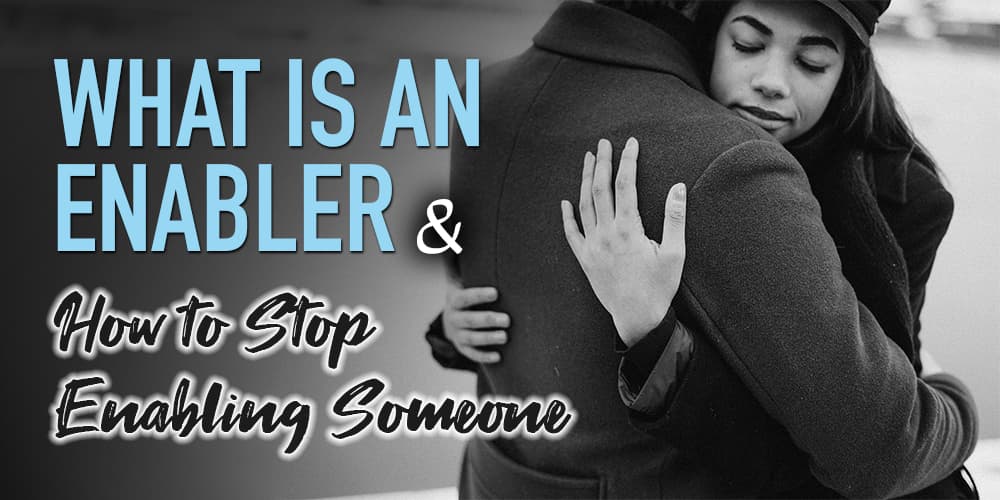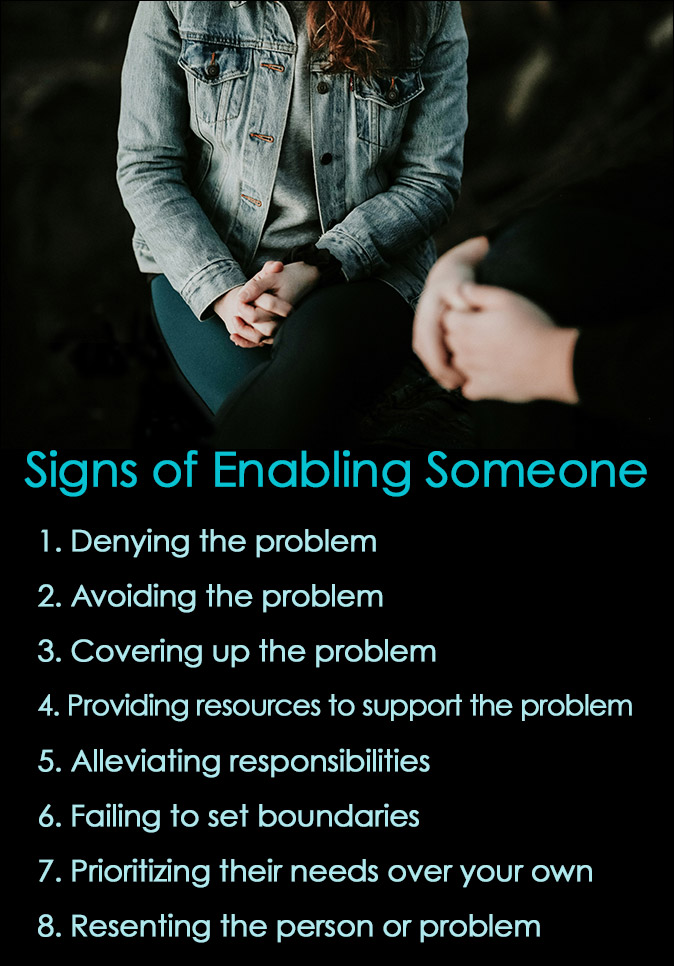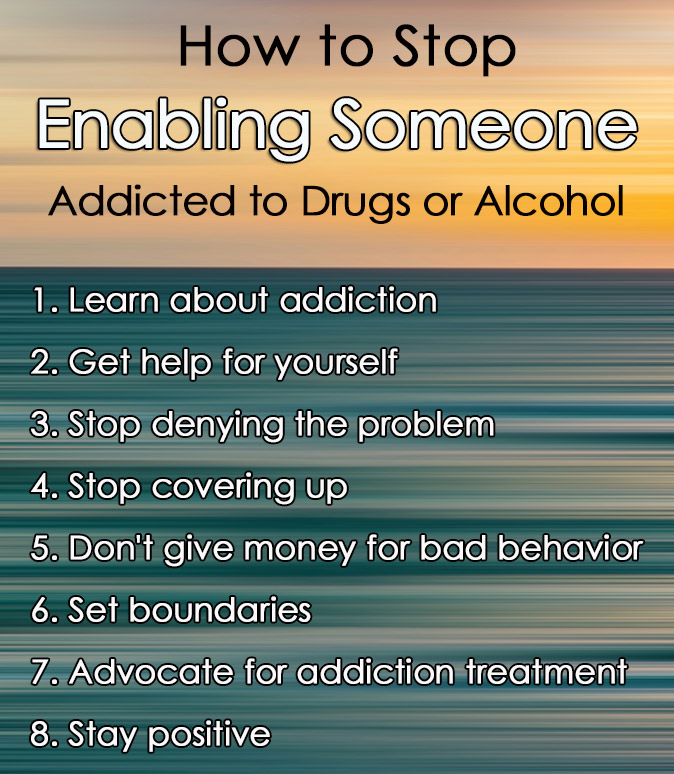
It can be extremely difficult to help a person you care about who has a drug or alcohol dependence without becoming an enabler of their addiction.
Most of us would do anything in our power to support a friend or family member in need, and that usually involves giving them food, a place to live, and financial assistance.
Unfortunately, we don’t always recognize bad behavior or understand the severity of the problem until it’s too late.
We also don’t realize that our help may be enabling the unhealthy behavior to continue or become worse.
Despite good intentions, most enablers either don’t know they are promoting continued substance use, or how they can stop enabling someone without endangering the relationship with the person they are trying to help.
Definition of an Enabler
According to Merriam-Webster, the definition of enabler is, “One who enables another to persist in self-destructive behavior (such as substance abuse) by providing excuses or by making it possible to avoid the consequences of such behavior.”
Another word for enable is:
- Empower
- Facilitate
- Provide the means
- Make possible
- Allow
What is an Enabler?
The basic meaning of an enabler is an individual who empowers or provides support to another person so they can continue with harmful activities such as drug or alcohol use.
An enabler can be anybody, but it is often a family member or close friend who is enabling another family member or friend.
The harmful activity doesn’t need to be related to substance use, although addiction is one of the most common themes for enabling someone.
An example is a mother who is an enabler of her child with a drug addiction. She might not realize it’s a serious problem, or she may be in denial of the problem and view it as a bad habit vs addiction.
Because she loves her child, she provides financial support and makes excuses for why her child is struggling at school or work.
Instead of confronting the issue, the mother’s support promotes further drug use and delays the real help the child needs for recovery.
Despite well-meaning intentions, being an enabler means to help another person avoid the negative consequences of their actions so they can continue with the unhealthy behavior.
How Does Enabling Drug or Alcohol Use Affect Relationships?
Enabling a person’s substance use or addiction creates a negative codependency between the enabler and the person that depends on them. This creates a lack of trust and resentment that can strain relationships.
When drugs or alcohol take priority over the personal relationship, it negatively impacts intimacy and emotional attachment.
Many times, a codependent enabler puts the needs of the person that is dependent on them ahead of their own personal needs, or the wellbeing of their children and other family members.
When this occurs, it can cause the relationship of all family members to suffer.

Signs of Enabling Someone
It’s easier to understand what an enabler is than to recognize the signs of enabling bad behavior. But identifying the latter is necessary to stop doing it and to help a person overcome their problem.
Here are the most common signs of enabling:
1. Denial of a problem
2. Avoiding the problem
3. Covering up the problem
4. Providing resources to continue the problem
5. Alleviating responsibilities
6. Failing to set boundaries
7. Prioritizing their needs over your own
8. Resenting the person or the problem
8 Signs of Enabling Bad Behavior
1. Denying There is a Problem
Many addicts deny they have a problem with drugs or alcohol. It’s common for enablers to also deny that someone they care about has a problem until things get too bad or they’ve finally had enough.
2. Avoiding the Problem
After an enabler stops denying there is a problem, they may choose to avoid addressing it because they hope or think it will go away on its own. Ignoring it is much easier than confronting the issue and causing any conflicts.
3. Covering up the Problem
Spouses and parents sometimes lie and make excuses to other people about their family member having a problem with drugs or alcohol. Covering up the problem does not make it go away and further enables substance use.
4. Providing Resources That Promote the Problem
Enablers will give addicts money, food, and a place to live despite continued substance use or any attempt to stop using drugs or alcohol. Paying a person’s bills and giving them money with no expectations of repayment will only fuel more drug use.
In addition to regular financial support, some enablers will also pay for a person’s bail or court costs to further avoid any negative consequences of their actions.
5. Alleviating Responsibilities
Aside from financial obligations, enablers will often relieve a person of other responsibilities like taking care of their children, cleaning the house, and making meals. This may be necessary because they are unable or unwilling to meet the needs of their personal obligations.
6. Failing to set Boundaries
By not setting boundaries or requiring a person to be accountable for their actions and the support provided by the enabler, an addict will continue their bad behavior.
7. Prioritizing their needs over your own
Parents and spouses make many sacrifices for family members, and they do it out of love. But prioritizing another person’s needs over your own needs can make it impossible to effectively care for yourself and another person.
Recognize when this happens and make self-care a priority so you can be there to continue providing support as needed.
8. Resenting the person or problem
Over time, an enabler begins to resent the person or problem they have been supporting. Sometimes this causes a conflict, while other times they finally decide to stop giving support.
Recognizing the signs of being an enabler is important to stop it before it goes too far. Once it reaches the resentment stage, many people stop providing support and it can have a negative impact on a once loving relationship.
How to Stop Being an Enabler
Identifying enabling behavior can be challenging, but it’s even more important to know how to stop being an enabler.
1. Learn about addiction
2. Get help for yourself
3. Stop denying there is a problem
4. Stop covering up
5. Don’t provide financial support for bad behavior
6. Set boundaries
7. Advocate for addiction treatment
8. Stay positive

8 Ways to Stop Enabling Someone Addicted to Drugs or Alcohol
1. Learn About Addiction
The first thing to do if someone you care about has a problem with drugs or alcohol is to learn more about addiction and the long term effects of drugs.
Addiction is a complex disease of the brain and it’s difficult to understand if you’ve never had a problem with drugs or alcohol.
Consider it to be like cancer or any other disease. Talk to doctors, medical professionals, and do research online.
Understanding that people don’t choose to become addicted, and knowing why people can’t simply stop using drugs or alcohol will make it easier to provide positive support for overcoming the problem.
2. Get Help for Yourself
If you want to stop enabling another person, you must get help for yourself first. You need to be in a healthy place to properly support a person who is addicted to drugs or alcohol.
Practice self-care to ensure your physical and mental well-being is prepared to take on the journey of recovery.
There are many support groups like Al-Anon that are intended specifically for family and friends of people addicted to drugs and alcohol. The people in these groups have been where you are now, and they can provide much needed guidance and encouragement.
3. Stop Denying There is a Problem
Now that you know more about addiction, stop denying there is a problem and confront it head on. It’s time to have a serious conversation about getting professional help for your loved one. State your intentions and make sure the conversation originates from a loving place. Be firm, yet supportive.
4. Stop Covering Up
Tell your loved one that you are there to help in a positive way, but you will not be covering up for them anymore. If they want your help, they will need to be open and honest about their addiction with themself and others.
5. Don’t Provide Financial Support That Enables Bad Behavior
Let them know you understand how your previous financial support was enabling their addiction and bad behavior, and it will end now. You will only support them in positive ways that have a direct impact on their healing and recovery.
You can pay for living expenses bills directly, if necessary, but do not give any cash money that could be used to buy alcohol or drugs.
6. Set Boundaries
Setting boundaries can be difficult, but necessary for staying on track. Clearly explain what you expect them to do and what behaviors will not be tolerated. This includes managing all personal responsibilities they have been neglecting.
If they violate any of the rules, there will be consequences and they will lose your support and possibly be out on their own. This is the time for tough love.
7. Advocate for Professional Addiction Treatment
After learning more about addiction, you should now realize that most people do not recover on their own and almost always require professional treatment.
Enabling recovery by offering incentives to change is a healthy way to empower someone you care about to get treatment.
Doctors, therapists, and support groups can recommend appropriate treatment programs. This is one area where you can offer financial support.
8. Stay Positive
If you’ve made it this far, you’re in a good place. Recovery is a long and challenging process. Stay positive and be there to show your continued love and support.
Remember, being an enabler does not mean you’re an irresponsible or bad person. Even if empowering bad behavior leads to unhealthy consequences, it is almost always done from a place of love and support.
Being able to identify the signs of enabling someone and taking steps to correct them is crucial for promoting healthy behaviors.
Related Posts
- Signs Of Addiction To Watch For
Addiction is a serious disease and it is imperative for it to be regarded as…
- Alcohol Dementia Causes, Symptoms and Treatment
Note: Alcohol Dementia goes by many names including, alcohol-related dementia, alcoholic dementia, and alcohol-induced dementia.…
- Alcohol Poisoning and Hangover Symptoms
Most adults who drink alcohol, either regularly or on special occasions, are likely to have…
